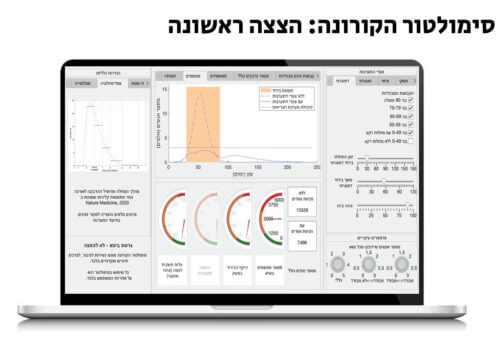A team of experts from the Technion and the Civilian Cabinet built a simulator that allows to assess how the government's various policy measures will affect the continued spread of the corona epidemic in Israel. After incorporating data from all over the world into the simulator, in the next two weeks they will add data on the effect of the opening of the lockdown in Israel - and release the simulator to the public

The mathematics of the epidemic: a joint team of the Technion and the "Civil Cabinet" project is developing a simulator adapted to the Israeli economy, which will help the decision makers to examine different alternatives for action. The simulator will allow users to examine different policy directions and their consequences not only for the health system, but also for the Israeli economy, the extent of social isolation and the state budget.
The simulator is designed to assist decision makers in managing the handling of the corona epidemic, through a user-friendly interface that allows for the connection between policy measures (such as isolating groups at risk or personal isolation orders) and various outcome indicators (such as the forecast of the deceased, the extent of respiratory infections and the loss of output to the economy), both in the short term and In the long term. It is being presented these days for comments to various parties, and has even received support from officials at the government headquarters.
So far, the team has completed the modeling of the demographic and personal isolation measures. In the next two weeks, with the accumulation of data about the impact of the opening of businesses and possibly the opening of the education system, additional data will enter the model, in order to weigh them all together. When completed, the simulator will allow users to examine the consequences of various policy measures including: total closure, isolation of certain age groups in the population, partial or full opening of the education system, the use of protective measures such as social distancing, hand washing and wearing masks, up to the issue of opening the skies for flights. The users will be able to insert a set of variables and receive the set of effects derived from them, thus expanding the discussion from narrow contexts such as the number of available beds or the obligation to use protective masks.
The team is led by Technion researchers Prof. Nir Gabish from the Faculty of Mathematics and Prof. Omri Barak from the Rapaport Faculty of Medicine - both are members of the Inter-Unit Program for Applied Mathematics at the Technion, alongside Prof. Tami Shohat, who until recently served as the head of the Center for Disease Control at the Ministry of Health, and Dr. Rabbi Gal Alon, head of the Civilian Cabinet project who previously established the policy planning system in the government. Other partners are Dr. Lydia Peres Hari from the Faculty of Mathematics, Itamar Menuhin - a graduate of the Technion Rothschild Program for Excellence at the Technion and currently a master's student at Tel Aviv University, Lehia Friedman, lecturer and director of the Excellence in Strategy and Decision Making Program at the Lauder School of Government, Diplomacy and Strategy at the Interdisciplinary Center Herzliya and Ofek Mushakt, an undergraduate student in the program.
According to Prof. Gavish, "Recently, various plans for exiting the quarantine were presented to the public, some of them even contradictory, but the mathematical models on which they are based were not presented. The sharing of information about these tools and the data on which they are based will allow for a substantive discussion on the exit plans from the quarantine, and will be fertile ground for the contribution of the scientific community to the decision-making process."

"One of the main values we adhere to is transparency," says Prof. Barak. "Transparency means real participation by the public - the simulator will be available to anyone who wants to use it, so the public will be able to understand why certain decisions are made and not others. Such a move will deepen public trust, which in our eyes is a resource almost as important as hospital beds. Transparency-based trust will increase compliance with guidelines and thus benefit us all."
The developers emphasize that the simulator is in the development process, and will incorporate the data of the next two weeks, as it is published. "Even when it is completed," says Prof. Barak, "it will not replace decision-making and will not provide unequivocal operative answers." The simulator will not provide a comprehensive answer to all questions, but will allow the decision makers to examine various options - guidelines, prohibitions, etc. - and evaluate them based on their expected consequences. We hope and appreciate that many professionals will use the simulator and thus help improve it and improve the decision-making process."
The idea to build the simulator was born in the "Introduction to Applied Mathematics" course taught by Prof. Nir Gabish at the Technion. According to him, "I always bring to the course a test case that I work on with the students. In the current semester, the necessity of reality brought me to talk about models of the spread of epidemics and contagion. The preparation of the course gave birth to a blog where I write about the subject, and the blog led me to Dr. Gal Alon, head of the Civil Cabinet initiative, and Lehya Friedman, the professional director of the initiative."
"The Cabinet is a voluntary civil body that was recently established to promote decisions that will rescue Israel from the Corona epidemic and reduce its damage," explains Dr. Alon. "Our team combines leading experts who work to produce innovative and systemic solutions that will help the decision makers. In cooperation with the Technion experts, we wish to produce a toolbox that will allow users to see complex consequences for complex steps. It is not enough to focus on one aspect, for example the number of ventilators available, because there is a complex system of considerations and consequences, which includes occupational, social, economic, educational aspects and more."
Prof. Nir Gabish, faculty member in the Faculty of Mathematics at the Technion. He is a useful mathematician who uses a variety of analytical and computational tools to solve problems related to ion movement in biological or electrochemical systems, superconductivity, the theory of tenders, and more.
Prof. Omri Barak is a faculty member at the Rappaport Faculty of Medicine and the Center for Biological Network Research at the Technion. He studies how the dynamics of neuronal networks in the brain support learning and memory processes. This is through theoretical tools from the worlds of mathematics and physics and analysis of experimental information obtained from research laboratories with which he collaborates.
Dr. Gal Alon completed his doctorate at LSE (London School of Economics) in social policy. He worked as a lecturer from abroad at the schools of public policy at the Hebrew University and Tel Aviv University as well as a consultant for the development of strategic processes in the Prime Minister's Office.

2 תגובות
When the simulator takes into account the improvement of relations between humans, it will have a chance to succeed
Sounds crazy interesting and important!
When can we download and start using?